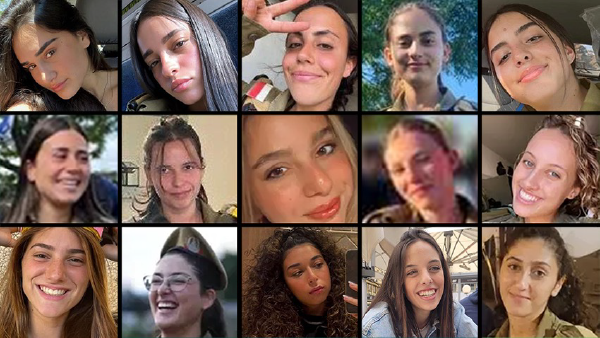By Leah Garber
In a country that throughout its 75 years of existence has experienced eight wars and many military operations, the army occupies a significant space in daily life. With military service mandatory for both men and women, the question “What did you do in the army?” is the first one asked in every job interview—even years after discharge. It’s easy to understand how public discourse revolves around the military, especially when a significant share of the state budget is earmarked for it.
For years there has been discussion around gender equality in the service. Are women capable of the grueling physical effort required in training? In battle? Do they have the mental fortitude to withstand the stress required on the battlefield, or will they be destined for safer, rear positions?
Ninety percent of all military positions are open to women, and they are 17% of the fighting force and 4% of the air force graduates. This war proved beyond a doubt that, like men, women are not only capable but also essential to the military system in all fields of service.
“Commander, commander, we are at war!”
On the black Sabbath of October 7, not long after the start of Hamas’s surprise attack, it was women in the observers’ unit—known as the “Army’s eyes”—who first recognized and warned of the terrorists’ penetration into Israeli territory and called in forces while firing at them.
Meanwhile, in the first phase of the vicious surprise attack, as terrorists breached fences, entered military bases, and knocked down cameras, 15 observers in Battalion 414 were not as fortunate. They were killed, and 15 pairs of eyes that had a lifetime of seeing still to do, went out at once.

One can only hope that those lovely smiles, full of the joy of life, are now smiling down at us from above. The eyes that watched over us here on earth are now twinkling stars in the night sky.
“The heroine of Kibbutz Nir Am” is how 25-year-old Inbal Lieberman, the kibbutz’s security coordinator, is now known. When the shelling began, it sounded different than the noises she usually hears on the kibbutz. With unimaginable resourcefulness, Inbal took her gun and set up an alert squad that eliminated 25 terrorists in hours of battle. Inbal and her friends saved hundreds of lives, even as many others were lost in neighboring kibbutzim. Like many residents of the region, Inbal only wants a safe space to mourn, wearing the heroine’s crown that has been placed upon her head.
In the terrorist attack on the Sderot police station, Corporal Mali Shoshana from Ashdod climbed up to the station’s roof where she fought a heroic battle for hours, throwing back the grenade terrorists threw at her, killing at least four of them. Thinking she would not survive the battle, Mali asked those on the other end of her walkie-talkie to tell her son she loved him. Thankfully, by pretending to be dead, she survived, and following the long battle, she hugged her son and whispered her love to him directly.
The late Sergeant Osher Simcha Barzilai served as an operations sergeant in the northern division of the Gaza Division. She and most of her fellow soldiers were killed by Hamas gunfire when terrorists penetrated the outpost where they served. Osher, whose name means happiness and joy, was a gifted student blessed with many talents, but her biggest dream was to become a brain surgeon, a dream that now will go unfulfilled.
The stories of the determination, commitment, and bravery demonstrated by these women are inspiring. Unfortunately, many of them paid the ultimate price.
Earlier today, I was among the many thousands who accompanied Border Patrol soldier Rose Lubin—a lone soldier from Atlanta stabbed to death by a terrorist earlier this week—on her final journey.
Rose was many things, but she certainly was not alone. The mass of people who came from all over Israel, including the police chief of staff and other senior officials from the army and the police, gave Rose’s family the warmest, most embracing, supportive sense of belonging imaginable.
The roads leading to Mount Herzl, the largest military cemetery in Israel, were packed long before the funeral. Rivers of people flowed toward Rose’s gravesite, which overlooks the Jerusalem mountains. People of all ages, from all backgrounds, speaking Hebrew and English, came to honor the heroine of Israel. Rose, a lover of Jerusalem, was buried wrapped in the love of the holy city and the entire country. As Rose was fond of saying: “There are no boundaries, only endless possibilities.” Indeed, the world has lost a special person whose life had endless possibilities, dreams, and desires to make the world a better place. The beauty of Jerusalem and the cemetery’s serenity will envelop Rose for all eternity, protecting her from the evil and cruelty that took her life.
May Rose, and all men and women who made the ultimate sacrifice so that we might live, rest in peace, now and always.

Together, united, we will overcome.
Leah Garber is a senior vice president of JCC Association of North America and director of its Center for Israel Engagement in Jerusalem.